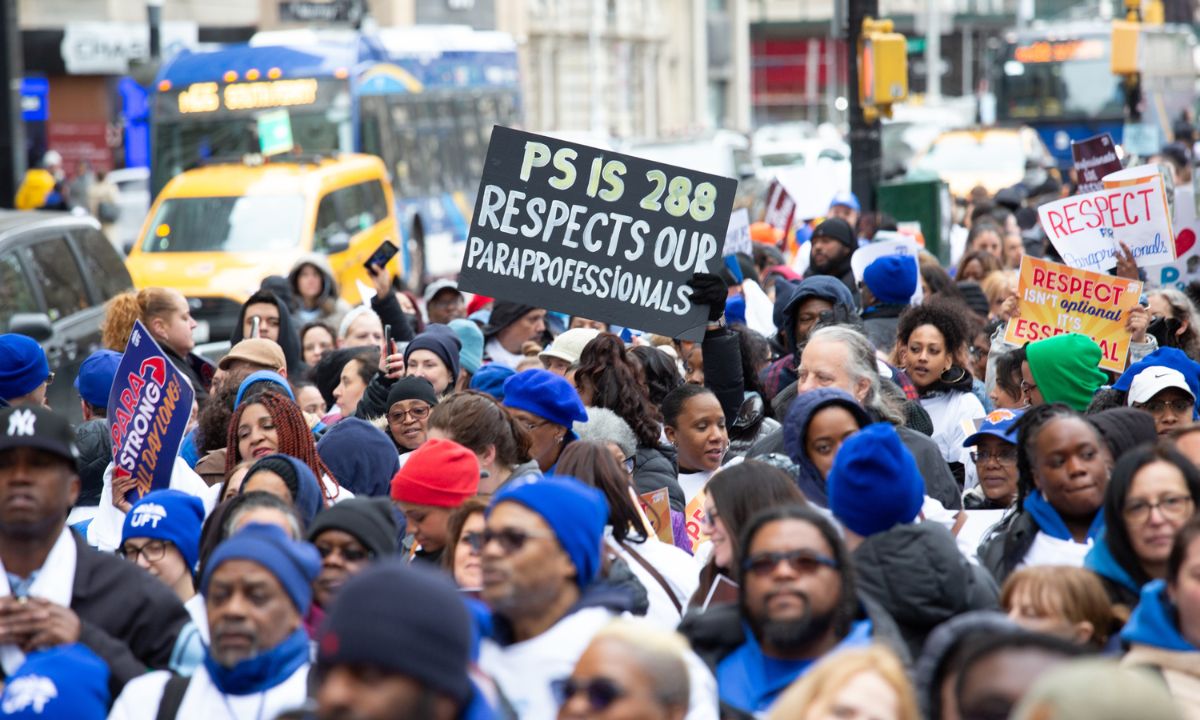Across the U.S., Unions Are Seeking Big Boosts to Paraprofessional Pay
Teachers unions are seeking to boost paraprofessional pay, which remains so low that workers are struggling to get by in many states.

Get stories like this delivered straight to your inbox. Sign up for The 74 Newsletter
During her first full-time job as a paraprofessional, Priscilla Castro would wake up at 6:00 a.m. to work at a high school in Brooklyn, where she helped educate teenage mothers. She would then head to her own night classes at York College, where she was pursuing her bachelor’s degree, sometimes not returning home until past 11 p.m.
At the time, Castro’s salary was less than $20,000. Two decades later, after earning both her bachelor’s and master’s degrees in sociology and urban studies and working as a special education and a language paraprofessional, she is earning $55,000 – still far below what most people would need to earn to afford to live in New York. To help her make ends meet, Castro lived with her parents early on in her career.
But the main reason she has stuck with it? The impact she has had on the kids.
“We are there with the students every period, so we see the challenges the students go through and their success,” Castro said. “To me, it’s amazing to see, especially when I’m [working with] an autistic child who, for the first time, is learning how to read and learning how to write their name.”
Castro now advocates for other classroom support staff as the president of the paraprofessional chapter of the United Federation of Teachers in New York City. The city is currently struggling with a shortage of more than 1,550 paraprofessionals. Hoping to attract and retain more people to the profession, the union is stepping outside of its traditional collective bargaining practices to push for legislation that would mandate raises of at least $10,000 for the city’s paraprofessionals.
Paraprofessionals are usually hourly workers who assist students and teachers with classroom work, supervision and instructing small groups. Roughly 75% of paras don’t have a bachelor’s degree, according to a 2021 Brown University study. Average pay for paraprofessionals in 2024 was $35,240, according to the U.S. Bureau of Labor Statistics.
Across the U.S., unions are seeking to boost paraprofessional pay, which remains so low that workers are struggling to get by in many states, according to an April report from the National Education Association.
A 2022 NEA survey found that more than half of paraprofessionals worked other jobs on weekdays after classes ended and 75% said they had a problem making a living wage.
The NEA said in its most recent report that while paraprofessional pay has improved, “there is still a lot of work to be done.”
In April, paraprofessionals in Boston landed raises ranging from 23% to 31% over three years Most will see a pay increase of nearly $8,000 by the end of the contract, according to the Boston Teachers Union.
Allentown School District in Pennsylvania accepted a contract last fall that will give its paraprofessionals 22% raises. Pittsburgh Public Schools awarded its paras raises of 14% in December.
In addition, California lawmakers are considering a bill that would increase pay for both teachers and staffers, including paraprofessionals, by 50% over the next 10 years.
“I’ve received strong support from teachers and [other school] employees who are struggling to live in the communities that they work in,” said Assemblyman Al Muratsuchi, who authored the bill.
Dannel Montesano is one of them. She left her paraprofessional job earlier this year to become an office clerk at Liberty Ranch High School in Galt, California. The new job paid just $1 more per hour. It was the only way she could get a raise.
“Our starting paraprofessional pay is $18.63 an hour. This school year, we’ve had a hard time filling all of the positions because when you can go work at McDonald’s for over $20 an hour — and not have as much responsibility working one-on-one with students —- the draw isn’t there,” she said.
In New York City, paraprofessionals earn between $31,787 to $52,847 a year, according to the UFT. The city’s current system of collective bargaining ensures all job titles receive the same percentage wage increase. But those increases have a varying impact depending on an employee’s base pay. The union said in a press release that a 3% pay raise could mean roughly a $900 increase for a paraprofessional but a $6,000 bump for a principal.
More than 1,600 union members rallied in front of City Hall in April to advocate for the paraprofessional pay bill, which would create a separate “para pay index” that would exist outside of collective bargaining. Each year, the city’s general fund would provide full-time paraprofessionals with a check of at least $10,000.
“We have paraprofessionals who are struggling,” Castro said. “I received an email from a paraprofessional who’s living in a shelter with a child. It broke my heart to receive this email. We have to make a difference. We have to ensure that the bill is passed in City Hall, because it would change so many lives.”
Get stories like these delivered straight to your inbox. Sign up for The 74 Newsletter

;)
